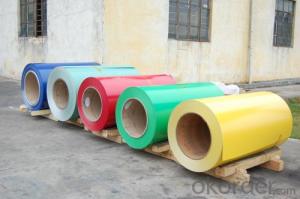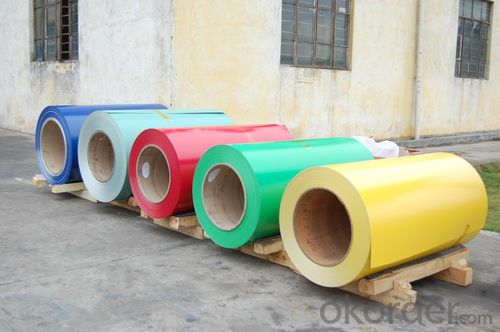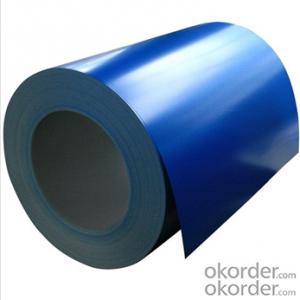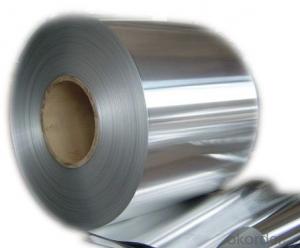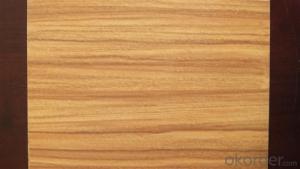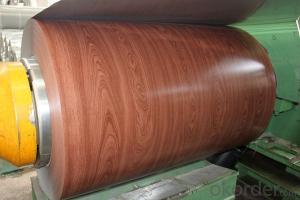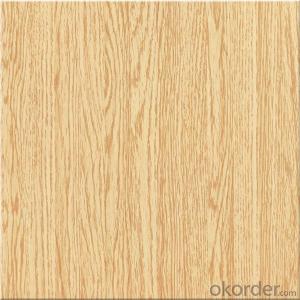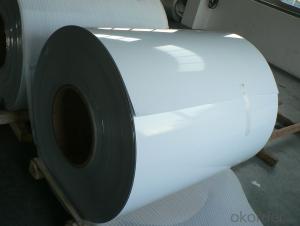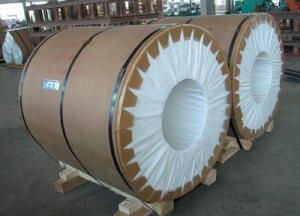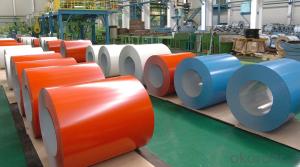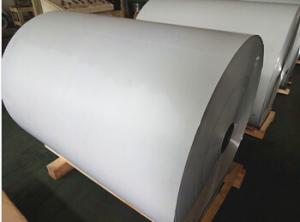032 Aluminum Coil Black - Prime Z40 Coating Color Aluminum Coil with High Quality
- Loading Port:
- Shanghai
- Payment Terms:
- TT OR LC
- Min Order Qty:
- 5 m.t.
- Supply Capability:
- 10000 m.t./month
OKorder Service Pledge
OKorder Financial Service
You Might Also Like
Specification
1. Specification of Prime Z40 Coating Color Aluminum Coil with High Quality
Material | Alloy Aluminum 6063,6061,6005 or customer nominated |
Temper | T3, T4, T5, T6 |
Surface | Anodize, electrophoresis, powder coating, PVDF coating, wood grain painting, matted, etc. |
Colour | Any colour based on Standard Germany RAL Mark |
Length | Coating 6.5 meters, Anodizing 6.5 meters, Mill finish 5 meters |
Press Machine | 500-4000 tons all together 64 press lines. |
Fabrication | 1. Windows and doors; 2. Drilling; 3. Bending; 4. Cutting; 5. etc. |
Certificate | ISO 9001 |
Moulding | 1. Using our moulds, no fee; |
2. Using customer drawing, opening mould, usually about 10~50 tons then the moulding can be refunded. | |
3. Mould cost is negotiable base on the order quantity | |
Capability | Annual output 100,000 tons |
2. Application of Prime Z40 Coating Color Aluminum Coil with High Quality
(1).Interior: wall cladding, ceilings, bathrooms, kitchens and balconies, shutters, doors...
(2).Exterior: wall cladding, facades, roofing, canopies, tunnels,column covers , renovations...
(3).Advertisement: display platforms, signboards, fascia, shop fronts...
3. Feature of Prime Z40 Coating Color Aluminum Coil with High Quality
*Such coil is specially designed to replace aluminum ingot, due to the high export tax of aluminum ingot, the coil has better price than ingot.
*This type of coil can fit customer's remelting furnace just like ingot, no need to make any change to the production line that was previously used for ingot. The standard coil size and weight is very suitable for the feed gate of furnace.
*This type of coil causes less material wastage than ingot when remelted.
*Our coil is made directly from ore, no need to go though the ingot making process, quality is much better than other suppliers who use ingot scrap to make coil.
Be free from Oil Stain, Dent, Inclusion, Scratches, Stain, Oxide Dicoloration, Breaks, Corrosion, Roll Marks, Dirt Streaks and other defect which will interfere with use
4. Certificate:
SGS and ROHS(if client request, paid by client), MTC(plant provided), Certificate of Origin(FORM A, FORM E, CO), Bureau Veritas and SGS (if client request, paid by client), CIQS certificate
5. Image of Prime Z40 Coating Color Aluminum Coil with High Quality
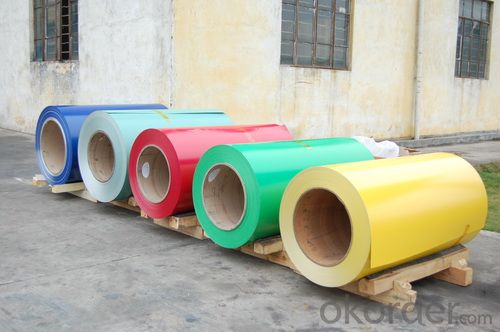
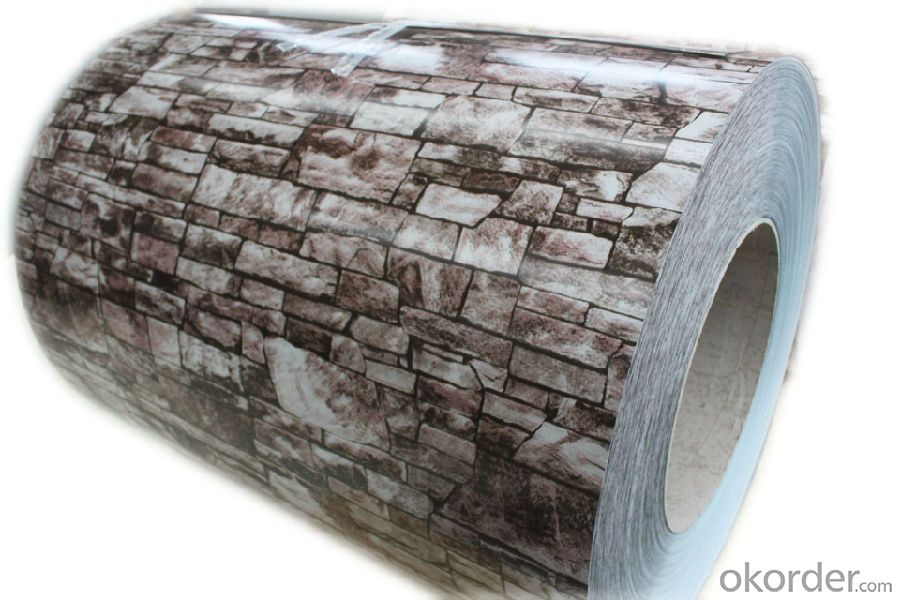
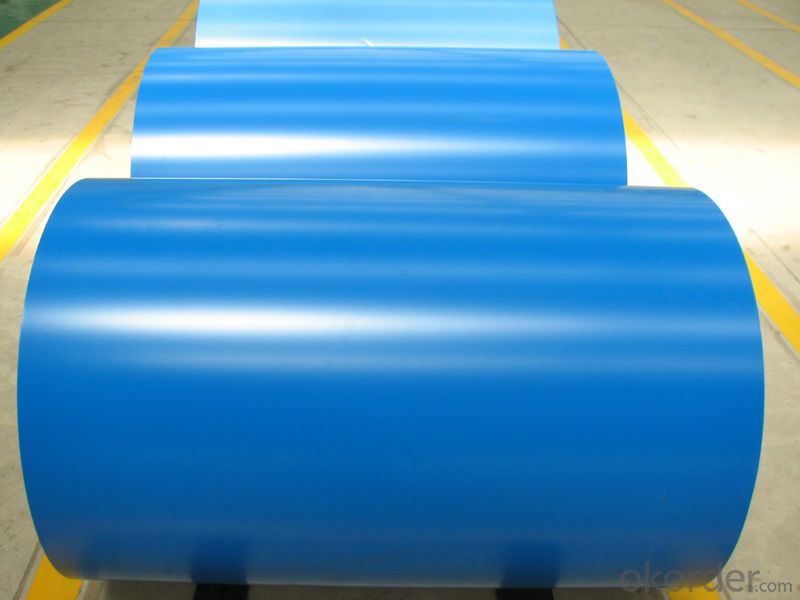
6. Package and shipping of Prime Z40 Coating Color Aluminum Coil with High Quality
eye to wall
eye to the wall
with wood pallet (wooded case also available)
7. FAQ
1) What is the delivery time?
Dpends on actual order, around 20 to 35 days
2)What is the QC system:
We have QC staff of 20 persons and advanced equipment, each production is with MTC traced from Aluminum ingot lot.
3) What market do you mainly sell to?
Australia, America, Asia, Middle East, Western Europe, Africa etc
- Q: What are the common surface finishes available for aluminum coils?
- Aluminum coils come in various surface finishes, each with its own advantages and aesthetic appeal. One popular option is the mill finish, which is the standard finish applied directly from the mill. It provides a smooth and shiny surface without any additional treatments or coatings. Another common choice for aluminum coils is the anodized finish. This involves an electrochemical process that creates a durable and corrosion-resistant layer on the aluminum's surface. Anodized finishes can be clear or colored, offering a wide range of design options. Painted or coated finishes are also widely used for aluminum coils. This involves applying a layer of paint or coating to enhance appearance and protect against corrosion. The color, gloss level, and texture of painted finishes can be customized to suit different design needs. Brushed finishes are often employed for aluminum coils, creating a pattern of fine lines or scratches on the surface. This unique texture adds visual interest to various applications. Laminating is another option for aluminum coil finishes. It involves applying a thin layer of film or other material to provide additional protection against scratches, UV rays, and other elements. The laminated finish can be glossy or matte, depending on the desired look. In summary, the available surface finishes for aluminum coils include mill finish, anodized finish, painted or coated finish, brushed finish, and laminated finish. Each finish has its own advantages and can be chosen based on specific requirements such as aesthetics, durability, corrosion resistance, and customization options.
- Q: Can aluminum coils be used in automotive body panels?
- Automotive body panels can indeed utilize aluminum coils. Being both lightweight and corrosion-resistant, aluminum proves to be a suitable material for automotive purposes. The employment of aluminum coils in body panels yields numerous benefits, such as enhanced fuel efficiency owing to the reduced vehicle weight, improved handling and maneuverability, and increased durability. Moreover, aluminum boasts high recyclability, rendering it an environmentally conscious alternative for automotive production. Numerous automakers have already begun integrating aluminum coils into their vehicles, and this trend is anticipated to persist as the industry aims for lighter and more environmentally sustainable automobiles.
- Q: What is the role of aluminum coils in the construction of ships?
- Aluminum coils are used in the construction of ships primarily for their lightweight and corrosion-resistant properties. They are commonly used in the fabrication of ship hulls, decks, and superstructures. The use of aluminum coils reduces the overall weight of the ship, improving fuel efficiency and increasing payload capacity. Additionally, the corrosion resistance of aluminum helps to prolong the lifespan of the ship, reducing maintenance costs in the long run.
- Q: What is the maximum width of aluminum coils?
- The maximum width of aluminum coils can vary depending on the specific manufacturer and application, but it typically ranges from 60 inches to 96 inches.
- Q: Four roller rolling mill roller bearing on the aluminum top how always have holes, in the production process, will be printed on just above the work roll, the work roll used in less than a day, it will produce a pothole, and aluminum plate will be printed from the upper supporting roller above the straight line, the line in the above there are holes.
- Well, typical aluminum plate surface defects in the backup roll print, solution, change support roll.Do not know your factory function division, should have special polishing work roll, support roller grinding workshop, this problem should be addressed to them, sticks are not qualified, how can dry out qualified products?
- Q: What are the common surface protection methods for aluminum coils?
- There are several common surface protection methods for aluminum coils that are widely used in various industries. These methods aim to protect the surface of the aluminum coils from corrosion and other forms of damage, ensuring their long-term durability and performance. One of the most common surface protection methods for aluminum coils is anodizing. Anodizing involves immersing the aluminum coil in an electrolyte bath and applying an electric current to create a protective oxide layer on the surface. This oxide layer not only enhances the appearance of the aluminum coil but also improves its resistance to corrosion, scratching, and wear. Another popular surface protection method is coating. This involves applying a protective layer of paint or coating material onto the surface of the aluminum coil. Coatings can be applied through various techniques such as electrostatic spraying, roll coating, or coil coating. These coatings provide a barrier between the aluminum surface and external elements, protecting it from moisture, UV radiation, and other environmental factors that can cause corrosion and damage. In addition to anodizing and coating, aluminum coils can also be protected through the use of protective films. These films are usually made from polyethylene or similar materials and are applied to the surface of the coil as a temporary protective layer. Protective films help prevent scratches, abrasions, and other forms of damage during transportation, storage, and installation. Once the aluminum coil is ready to be used, the protective film can be easily peeled off, leaving a clean and undamaged surface. Furthermore, aluminum coils can be protected through proper storage and handling practices. Storing the coils in a dry, clean, and well-ventilated area, away from corrosive substances, can significantly prolong their lifespan. Handling the coils with care and using appropriate lifting and transportation equipment can also prevent physical damage that can compromise their integrity. Overall, the common surface protection methods for aluminum coils include anodizing, coating, the use of protective films, as well as proper storage and handling practices. By employing these methods, aluminum coils can be effectively safeguarded against corrosion, scratching, and other forms of damage, ensuring their optimal performance and longevity.
- Q: Are aluminum coils suitable for roofing?
- Yes, aluminum coils are indeed suitable for roofing. Aluminum is a highly durable and lightweight material that has been widely used in the construction industry for roofing purposes. It offers numerous benefits such as being resistant to rust, corrosion, and fire, making it an ideal choice for areas with harsh weather conditions or high humidity. Aluminum coils are also known for their excellent thermal conductivity, which helps in reflecting sunlight and reducing energy consumption, leading to lower cooling costs. Additionally, aluminum roofing is easy to install and maintain, providing long-lasting protection for residential, commercial, and industrial buildings.
- Q: Can aluminum coils be used in high-radiation environments?
- Depending on the level of radiation exposure, the performance and durability of aluminum coils may be affected when used in high-radiation environments. Aluminum, which is a relatively good conductor of heat and electricity, is suitable for various applications, including coil systems. However, exposure to high levels of radiation can make aluminum more susceptible to degradation and corrosion. In high-radiation environments, the main concern is the potential damage caused by radiation. Compared to metals like stainless steel or titanium, aluminum has relatively low radiation resistance. This means that prolonged exposure to high radiation levels can result in structural changes, such as embrittlement and loss of mechanical properties. To mitigate these risks, several factors must be taken into account. The specific radiation level, duration of exposure, and intended use of the aluminum coils are critical in determining their suitability for high-radiation environments. Additionally, applying protective coatings or treatments can enhance the radiation resistance of the aluminum coils, improving their durability and lifespan. Ultimately, the decision to use aluminum coils in high-radiation environments should be based on a thorough assessment of radiation levels, potential risks, and specific application requirements. It may be necessary to consult radiation experts and consider alternative materials to ensure optimal performance and safety in these demanding conditions.
- Q: An aluminum bar 3.80 m long has a rectangular cross section 1.00 cm by 5.00 cm, what is the resistance and what is the length of a copper wire 1.50 mm in diameter having the same resistance?
- Resistance equals resistivity times length divided by cross-sectional area. R = ρ?l/A The resistivities at 20°C are aluminum ρ = 2.82×10??Ωm copper ρ = 1.72×10??Ωm So the aluminum bar with rectangular cross section has a resistance of R = ρ?l/(a?b) = 2.82×10??Ωm ? 3.8m / (0.01m ? 0.05m) = 2.1432×10??Ω The resistance of copper wire with circular cross section is given by R = ρ?l/(π?d?/4) = 4?ρ?l/(π?d?) Hence a wire of same resistance as the aluminum bar has a length of l = R?π?d? / (4?ρ) = 2.1432×10??Ω ? π ? (0.0015m)? / (4?1.72×10??Ωm) = 0.0220m = 2.2cm
- Q: The user is asking if it's safe to use aluminum coil for food preparation in a microwave oven.
- <p>No, you should not use aluminum coil for food preparation in a microwave oven. Aluminum is a metal and can cause sparks or even a fire when exposed to the microwave's electromagnetic field. It can also reflect microwaves, potentially damaging the oven. Always use microwave-safe materials such as glass, ceramic, or microwave-safe plastic containers for food preparation in a microwave.</p>
Send your message to us
032 Aluminum Coil Black - Prime Z40 Coating Color Aluminum Coil with High Quality
- Loading Port:
- Shanghai
- Payment Terms:
- TT OR LC
- Min Order Qty:
- 5 m.t.
- Supply Capability:
- 10000 m.t./month
OKorder Service Pledge
OKorder Financial Service
Similar products
Hot products
Hot Searches
Related keywords
